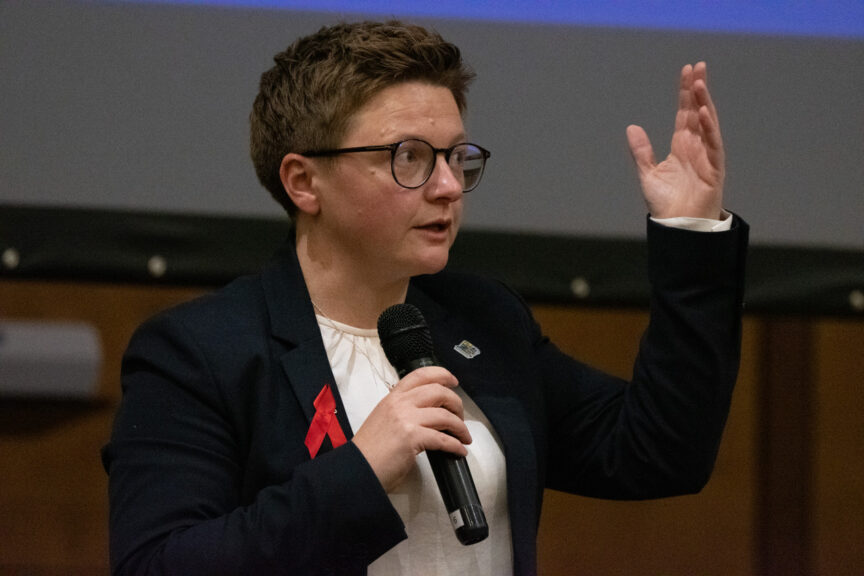The People’s Powerhouse say that they “bring northerners together so that they can decide what the future of the north should look like”.
The event, which was open to all that signed up, seemed to be a good opportunity for those that attended to have their say on the North’s future development.
But what is ‘the North’? Opinions vary, but one generally knows when they’re in it. Most of us would agree that Manchester clearly has a historic and current central claim of evolutionary economic importance within the region, no matter how it’s defined.
As a poem ‘We are the North’, by Nathan Parker, stated in the opening video shown to those gathered:
“Levelling up means nothing at all unless the people in power listen up to me and you.”

This set the theme for speeches and discussions to come, with the people being put at the centre of debate.
As Edna Robinson, Chair of People’s Powerhouse, introduced and welcomed the participants to the event this inclusivity was stressed:
“We are you.”
The emphasis was clearly put on people’s democratic representation in the region:
“There is a North that has a collective identity.”
“We have not got a way for the people of the North to have a democratic say. We are calling; clearly saying enough is enough.”

Nazir Afzal, Chancellor of the University of Manchester, introduced himself as:
“The People’s Powerhouse pain in the arse in residence.”
He pulled no punches when describing where he thought the North’s deficit in democratic representation and funding stemmed from.
“The Peoples Powerhouse is about amplifying the voice of people who are not heard.”
“You used to be able to draw a line between truth and dishonesty. Gaslighting is the word of the year isn’t it? Yesterday I was at a reception at Buckingham Palace. I left because Priti Patel and Suella Braverman turned up. They are typical of people who just love divisiveness. They wouldn’t know what the word integrity was if it hit them in the face. They don’t know what principles are. And that’s where we need to start. This great city, we are the home of the Chartist Movement, the Suffragette Movement, the Cooperative Movement, activist after activist. The People’s Powerhouse is the latest creation in my view.”
Afzal called for power to be moved from Westminster and given to the citizens, and for their voices to be heard. He called for those in power to be challenged, and authority and wealth to be shared.
“They can’t give us just scraps off the table; we want the whole table.”

Andy Burnham, scheduled for 10am, arrived twenty minutes late, but this did nothing to dampen his, or those in attendance’s, enthusiasm for the call for greater redistribution and representation for the North.
He opened his talk saying:
“We are here, we are not going away. We are not accepting the way things have been. And that power is definitely building.”
Burnham explained how the cost-of-living crisis had hit the North hardest and this had led to individual and collective resilience being reduced:
“People will be worrying themselves to sleep tonight. Wondering if they can afford Christmas presents for their kids.”
He referred to the promises that were made to the North, during Covid, that were now not being delivered. Describing the treatment of the North’s population by Westminster, he accused the government of treating northerners as second-class citizens. He promised that the Greater Manchester bus transport system will be put back into real control of the people. In addition, he indicated the prospect of a new devolutionary deal coming for the regions. However, he made clear that this would require a complete change of how Westminster works:
“We will never get to where we want to be without a complete rewiring of the system.”

The Manchester mayor recounted meeting the German ambassador recently, on their visit to the UK, and being struck by what he had said:
“In the German constitution, all of the regions of Germany, in law, must have an equivalence of standards of living.”
He asked the audience to imagine if this was applied to the United Kingdom and promised that next year the North would see decisive action.
“We are going to make 2023 a fightback year. We need to change the conversation.”
Jamie Driscoll (mayor of the North of Tyne) joining via video feed had been let down by the trains, a common theme echoed throughout the meeting with the oft-repeated fact that three times more is spent on transport services in the South than the North.
Driscoll urged people not to be fooled that the North would be, and has always been, lagging behind economically.
Paraphrasing Game of Thrones, he asked people not to be daunted by Westminster.
“Power lies where people think it lies.”
Driscoll decried the myth that the North will always be poor, when historically it had been so wealthy.

Bev Craig, Leader of Manchester City Council, continued the theme on the need for change for the economy, for Mancunians and tackling the region’s inequalities:
“We need to shift power and resource closer to our communities. Government, at all levels, needs to be changed. Nobody in power has the monopoly on good and new ideas.”
The day included workshops and discussions from a wide range of stakeholders from the regions of the North held in side rooms and the main conference room of Friends Meeting House. The collective call for dramatic change, echoed from the stage and the floor, was generally in unison and collaborative. The divisive forces in Westminster may well find empty slogans and promises will not stop the northern forces from rising.
Sign up to The Meteor mailing list – click here
The Meteor is a media co-operative on a mission to democratise the media in Manchester. To find out more – click here
All images: Gary Roberts


Leave a Reply